The Alliance and the year before us

Stephen Coertze
A conversation with Stephen Coertze, executive director of the Wycliffe Global Alliance.
What are some areas of focus for you and the Alliance leadership in 2023?
We will continue to focus on the areas of Bible translation, influences on the Bible translation movement and collaboration. Those still remain the critical areas of what we are doing, the context in which we are doing it and also the way in which we want to function and operate.
These three areas also help us understand the interplay of being reflective practitioners. That is something we continually want to instil through influence in our Alliance organisations. We always approach our ministry from a reflective position. Then the reflection always feeds into practice and it becomes an evaluation of our practice. It is serious thought and collective thought.
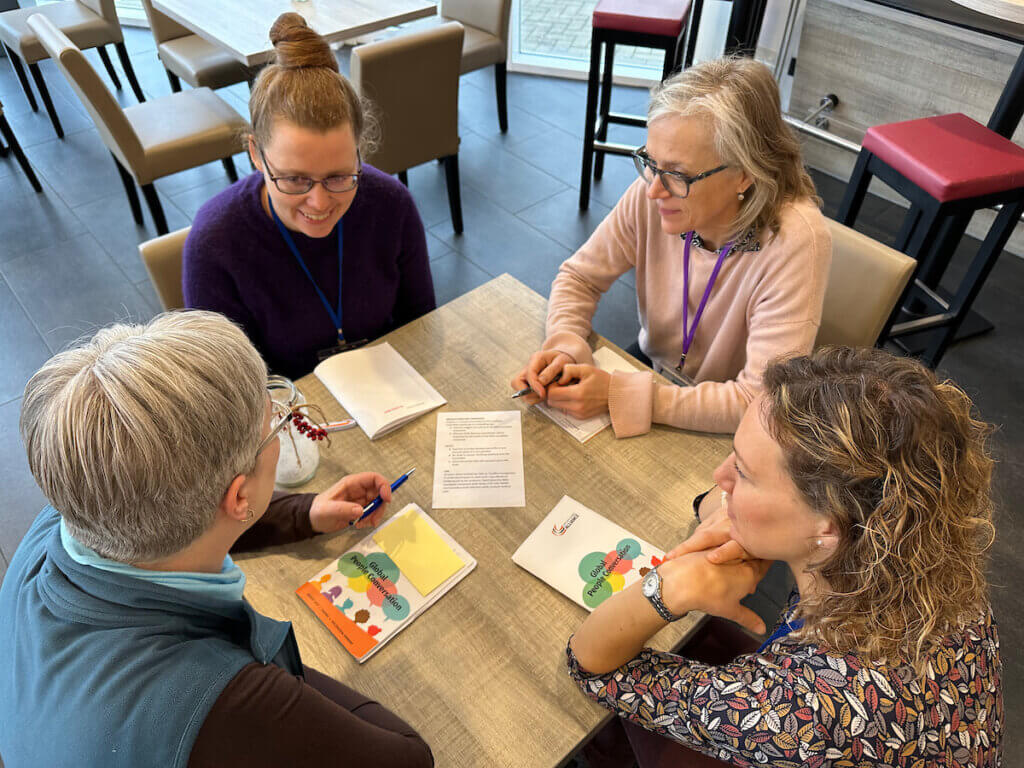
From the first Global People Conversation held in January 2023 for participants from 16 Alliance organisations from Europe. Clockwise from lower left: Agnieszka Domagala, (Wycliffe Poland), Lene Nielsen (Wycliffe Denmark), Agnes Lid (Wycliffe Norway), and Bea Balmer (Wycliffe Switzerland) in a table discussion. Photo: Elisabeth Berg
Along those lines, Global People Conversations are taking place this year among Alliance organisations. The first one was just held in Germany. What is the thinking behind those?
One of the questions we are trying to answer is, how do we respond to people who wish to serve in mission amid the changing realities of the world? Some of these realities have already been with us for some time, but have been accentuated through COVID and continue as lingering questions post-COVID. The pandemic has resulted in people asking different questions of life, and how they want to position themselves in life.
Some of our more-historic Alliance organisations were built around the business and missions concept of resourcing. The role of the Alliance organisation was to raise resources for SIL. They had to find people and money they could send to the field so that Bible translation could be done. Because of the way the finances were structured, the more recruits you sent to the field, the more funds you got and the more financially stable you were as an organisation. Then, over the years we started to see ebb-and-flow situations where recruiting was up or down. And this had financial implications on organisations.
To a point where some Alliance organisations were not sure they would survive, right? What does it look like today?
Some have changed their focus. Now they have a new life expectancy and hope for the future. Because they’re not seeing themselves as resource organisations anymore, but more as influencers of the church to get involved in mission or Bible translation. So now they’ve got to figure out what kind of structure they need to support that kind of ministry. It’s different than the one of sending people out and recruiting people for Bible translation. The whole model changes.
These questions were not new, but did the pandemic make them feel more urgent?
We were making piecemeal changes, and I think we need a better response to people serving in mission — to help our Alliance organisations understand the global context in which we are recruiting and sending people, but also to respond to the realities that they are facing post-COVID.
Could you outline some of those realities?
One is technological advances. For example, is the traditional missionary needed on the field? Do they have to pack their bags and go live somewhere else? Or can they work from home? What are the limitations of that? What are the benefits of that? These are questions that we have to ask.
Another is local agency. In the broader mission world, nationals — language communities, churches, social scenes, the local communities — are taking responsibility for their own future, their own destiny. When COVID came, missionaries were extracted from their field contexts and the locals continued with the work. We hear this among churches who are saying, “We have now proven to the world that we can function on our own. We don’t need expats to come and tell us how we should do things.”
I was speaking with one of our directors. They had recruited the perfect couple who was highly trained, highly skilled, but there was no field that wanted them. It was seen as an expensive exercise for these people to live among them, when they have locals who can do the jobs themselves.
This raises the question: Is there still space for foreigners to move to another country and serve in mission, especially in Bible translation? My response is yes, but we need to have discussion around this. What does this mean for us in Bible translation? It’s going to look different. And churches will continue to rethink their approaches to mission — where they’re going to invest their funds, where they’re going to invest their personnel, their missionaries.
No one would look at the pandemic as a good thing, but it sounds like you are seeing God working in it, even using it.
What is it that Winston Churchill said? “Never let a good crisis go to waste.” I think this is one of those crises that have helped us to think differently—to look at our practice and reflect on those new realities we are dealing with. This is why we are having these Global People Conversations. We are reflecting on these issues so we can adapt our practices accordingly, and maybe find better ways of dealing with people in mission.
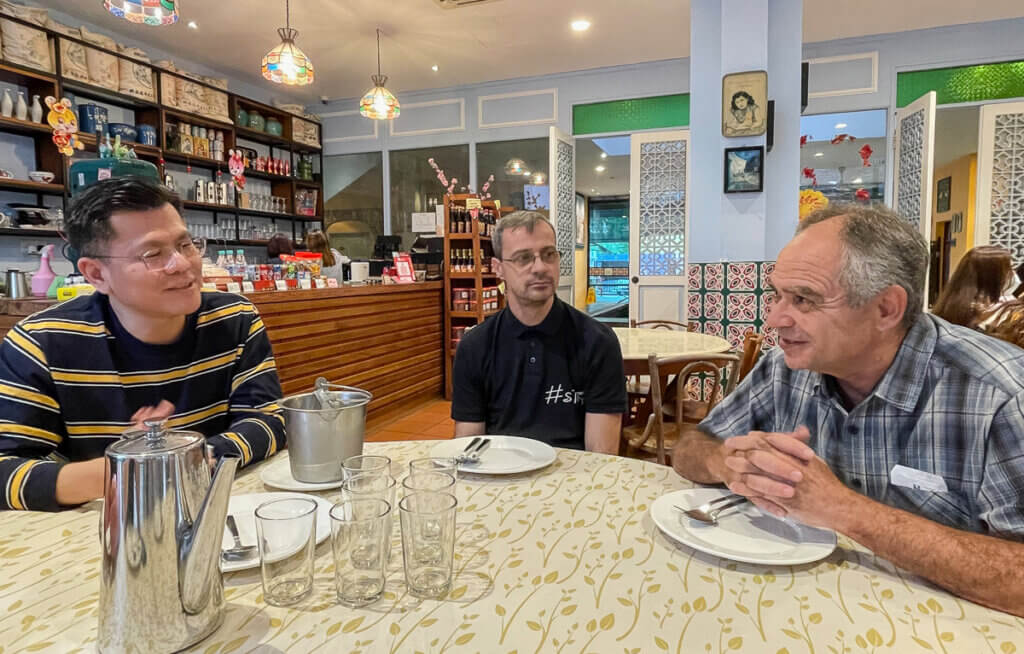
From left: Wong Fook Meng (Wycliffe Malaysia), Ruben Dubei (Europe Area director) and Stephen Coertze at the Alliance Leadership Team meeting in Malaysia, February 2023. Photo: Phil Prior
What are some other new realities you are thinking about?
One is escalation of migration. The shifting of language communities calls for a different approach to Bible translation and how we deal with people. To me, this is a potential for Europe area Alliance organisations. They have traditionally been resourcing organisations. But now these organisations have the opportunity to see what’s happening within their own countries. According to Progress.Bible, there are still 51 languages needing translation in Europe. So for these organisations to have these, while getting more language communities in their backyards, it opens a different opportunity for them. How can they approach these language communities? What does this mean for recruiting? What does this mean for utilising staff who are serving in other parts of the world, who are maybe finishing their assignments? Together with the church, they can start looking at strategies and how these language communities can be reached.
Another reality is disparity in the availability of resources. I want us to get beyond the notion that the Global South is sitting with the human resources and the West is sitting with the money. It might be true, but that should not be our model—that the traditional sending organisations see themselves as the financiers of Bible translation work in the global South. Because that deals with power issues. It deals with dependency issues. And so this comes into the conversation as well.
You have already mentioned the church and its relationship to Bible translation. Could you expand on that?
The church is continually growing in its desire to take up the responsibility of Bible translation — to get directly involved, and not only resourcing Bible translation through church members they are sending to agencies. The church wants more direct participation. This is not equal for all churches. There are many churches who probably haven’t shifted their thinking after COVID. But in general this is what we are seeing.
One example is the growing indigenous mission movement in Latin America. We are hearing from a number of churches saying, “We want to embark on Bible translation.” It is hurtful on the one hand when they ask if they can have our permission to do so — as if the Bible translation organisations hold the rights to this work and they need our permission. They absolutely have the right to do Bible translation. But being seen as custodians of Bible translation over the years, we have a responsibility to come alongside these churches and provide them whatever they need to be able to do good quality Bible translation.
So this touches on the whole issue of mother tongue speakers in translation. Training, equipping and resourcing all of these churches to participate. It touches on the area of full Scripture translation, because they don’t only want the New Testament. They want the full Scripture. And then it also raises a number of questions on the issue of consultancy.
There are many formats or models in which this can take place. We are not calling for a scenario where the church does the work and we come alongside the church and just provide resources, for example. We are talking collaboration here. Different models of collaboration where our Alliance organisations can come alongside the church in finding the appropriate model that’s going to work for each context in which there is still a need for Bible translation.
And that is not even to mention the changes that so many churches are experiencing related to the pandemic.
Many churches have lost a lot of active members during COVID, because of online services or because they just haven’t come back to church. We have seen a decline in attendance or active participation in church life. What does this mean going forward? We cannot just assume that we are going to get the same attention from the church post-COVID as pre-COVID. That relationship between the Alliance organisations and the church could have shifted, especially as we are dealing with the issue of recruiting people for mission.
In areas of the world where the church has stagnated, it feels like those are the same areas where the church has delegated missions to someone else. And where you are seeing the church more vibrant is where it is all folded together. Is that accurate?
Let’s use a hypothetical country. If that is the general perception of the church, that they have left their mission responsibilities to a mission agency, and now this mission agency is starting to quiver and lose focus because they are not finding recruits anymore, or they find the recruits and the field doesn’t want them, what are they communicating back to the church? If the organisation doesn’t have the capacity to rethink its role and its practice, what are they going to feed back into the church? And the church will become even more distant from mission.
The converse is also true. Where the church can say, “We’ve trusted the mission agency and they can’t help us find direction, so let’s figure out where else we can go to participate in mission.” So this can invigorate something in the church, or they can just find another organisation that they can send their people to. It’s a complex discussion, but these are the realities that we’re dealing with.
In the past you have mentioned that the Bible translation movement is in a great polycentric context, with many other voices now adding to the mix. Along with the church’s direct involvement, what else do you see?
Multiple new agencies and initiatives in Bible translation. We are not only seeing newcomers into the Bible translation movement such as YWAM and others. We are also seeing new initiatives in Bible translation. One example is Every Tribe Every Nation (ETEN)’s innovation lab. They are listening to what is happening in the world of Bible translation and then finding ways of responding, trying different kinds of initiatives and making recommendations to the world of Bible translation.
How do Alliance organisations respond to these new organisations? Will they, for example, start seeing the possibility of seconding people to YWAM or to other organisations? Could they even keep their personnel back home and have them participate in initiatives without having to send them to work under another organisation on the field? Then there is collaboration between these multiple agencies and initiatives. This also requires a different approach to personnel in ministry.
These pose questions to our traditional recruiting and sending models, and this is why we need to have discussions on this, to understand the current global sending context. How can we learn from this to gain collective wisdom? This is complex. This is not just the traditional sending world — it is also the traditional receiving world that is responding to the new realities. So we’ve got different contexts responding to these new realities and what it means for the Bible translation movement in general.
This would seem to point us back to the Global People Conversations as a way of confronting some of these questions.
We want to gain collective wisdom while we are having this conversation in the four Alliance regions of the world. Each area brings a unique mix to the conversation.
In Europe Area we have many traditional sending models. In Asia-Pacific Area we have a combination between traditional sending models but also receiving models and also new initiatives — for example, a number of churches in Indonesia that are directly involved in Bible translation. In the Africa Area, we sit with our traditional recipient organisations but also organisations recruiting for their own contexts. But now we are starting to see a number of these organisations sharing their human resources with other organisations. In the Americas, we sit with a unique context there as well. In North America we see global organisations with global footprints. So their approach is totally different from any of the others. Go to Latin America and we can sit with a very dynamic mission movement that is bringing excitement into the Bible translation movement, and vice versa.
So that is why the global conversation is very important, because it helps us to get a unique view from different perspectives of people’s involvement in the ministry of Bible translation.
You are also flipping the recent model for these types of conversations, right? Holding all four of the area conversations first, then the combined, global conversation last?
Yes. Those four conversations will set the tone for the kinds of discussions and outcomes we need at a global level. How do we sensibly adapt to these changing realities in terms of people serving in mission?
All of this is to help Alliance organisations understand the changes and adapt according to what they need to be in their own contexts, but this also helps us as an Alliance globally to understand the dynamics, as we have movement of people between organisations and also people being seconded to organisations outside of the Alliance.
Maybe we could take a broader view for a moment. I know you would agree that underlying all of this is a movement of the Holy Spirit, right?
Absolutely. God is building his kingdom. And God’s kingdom is bigger than the traditional churches involved in mission and the traditional mission agencies. God is at work in this world and we should not be surprised if there’s a growth in Christianity in communities. Where there’s a new movement of God’s Spirit in communities, the church is going to be sensitive to God’s calling on their lives and they’re going to desire to get involved in what God’s doing in this world.
I don’t want to say that Bible translation is low-hanging fruit. But it doesn’t take much for people to understand if God’s Word is not available in the heart language of people, they are going to struggle in understanding what church is all about, what Scripture is all about. So they will have a desire to get involved in Bible translation.
That must be exciting, as you look at some of the conversations happening in relation to the church’s role in all of this.
I think this is one area, hand in hand with the People conversation, that is going to bring new thinking into the Bible translation movement. When we look at the translation of the text ... this could challenge us in the continuum of literal, dictionary translations on the one hand and very open-ended, freehand translations on the other. This has been a standing conflict and this is going to help us think differently and have the needed conversations to understand the challenges that the church in Bible translation is going to bring to the table. It’s going to be a challenge, but also a helpful conversation so we can refresh our practices and how we approach Bible translation. So I am excited about what this is going to mean.
There is also some hesitancy, right?
Some have said this is not going to be the future of Bible translation because there are so many anecdotes of the church wanting to get started in translation and then it didn’t go well. That might be true. Similarly, we’ve got many anecdotes of when we started in Bible translation where it didn’t go well, either. But we matured. We grew. We developed our understanding. Now we sit with exceptional context where you’ve got organisations that are skilled in Bible translation that can come alongside the church and participate with the church and collaborate with the church. We get to see a much quicker maturing of the church just in terms of the church itself and also in the ministry of Bible translation.
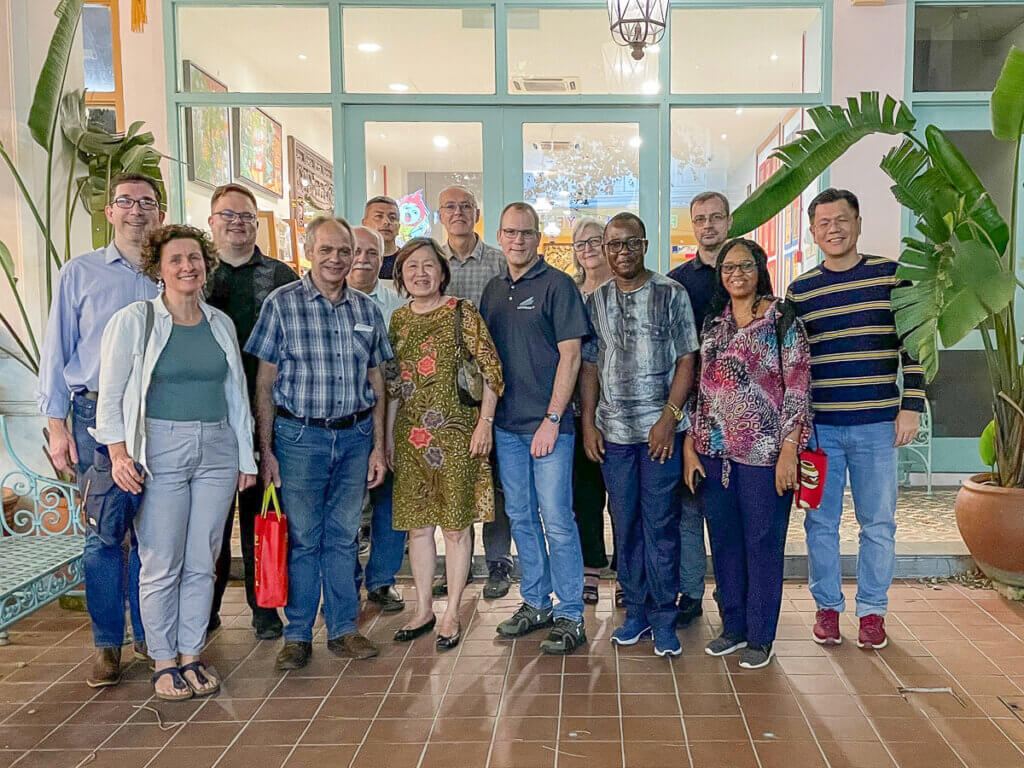
The Alliance Leadership Team with Lay Leng Tan and Wong Fook Meng of Wycliffe Malaysia, February 2023, Malaysia. Photo: Phil Prior
With so much happening in the world right now, does everything have a feeling of unfamiliarity to it? Like what got us to this point might not be exactly what carries us forward?
We are definitely moving into a new era for the Alliance — because of the global context that is around us and also the insights that we have gained through our missiological discussions that we have had up to this point. All of that is positioning us to move into a changing world.
I think the Russia-Ukraine crisis has deepened the complexity of the world post-COVID. If you follow the news, it is clear that this is a global issue. And it is not quieting down. So this is going to continue to impact the global economy, travel, infrastructures. Plus we have a looming Taiwan crisis.
In short, we have spoken for years now of a VUCA world — volatile, uncertain, complex and ambiguous. But added to this, the world is becoming more unstable. This is impacting mission. It is impacting geopolitical relationships, economics, anything you want to put under that camp. And then we are also seeing more ideological digging in of different groupings across the globe. All of this is leading to a great instability in the world.
Where does VUCA leave us as a Bible translation movement?
It is moving us into a new era of mission. I foresee that the growing role of Alliance organisations will be in the area of collaboration and facilitation. I think this is the growing, changing context that we are going to see. What does this mean for us as an Alliance? As Alliance organisations? How do we position ourselves in this complexity that we are seeing unfold before us?
I want to be an optimist, because this is God’s world and God is growing his kingdom and he will fulfil his purposes. I do think that things are going to continue to escalate and become more and more difficult until the time when Christ returns. So if this is complexity we are in now, it’s going to take a movement from God to bring a revival that is going to shift things around in ways that we cannot yet comprehend.
Short of that, for the foreseeable future I think things are just going to become more complex and more difficult.
Even in all this difficulty, what is God showing you that says things are going to be OK?
God’s Word gives us hope. Let’s get back to Hebrews 11 — faith is the unseen — trusting in God that he is going to accomplish what he has called us to. That is where our hope lies, in the confidence that God is going to fulfil his mission and purposes.
And we have a promise in the Gospel of Matthew — 1:23 where the angel says Jesus will be called Immanuel, God with us. And then the same gospel ends in chapter 28 where Jesus calls his church into mission and he says, “All authority in heaven and on earth has been given to me. As you go, make disciples of all nations.” And then he ends as he started: “Lo, I am with you always, until the very end of the age.
God with us. He has given us that promise and that is where hope lies.
I heard an interesting radio conversation the other day. It had nothing to do with Christianity, ... but the speaker said the ability of humanity to exist has always been to continue to live for the future. So continue to work your garden, continue to do repairs on your property, continue to look for work and to find life out there, and that’s the way we can exist. So if I bring that into the ministry of Bible translation, let us continue to do what God has given us, with this hope that God is with us and will be with us forever.
Another metaphor for this is the bride before the Lamb, when someone asks, “Who are these people and where did they come from?” Then he answers, “These are the people who came out of the Great Tribulation” (Revelation 7:14). They were clothed in white because God had redeemed them and God was with them. Even in the midst of tribulation. We see that throughout the prophets — Israel being taken a number of times into captivity and God was with them. They were always called wherever they found themselves to make the country better. To make the kingdom better. Then even to uplift those who are over them so they could have better lives in the context in which they lived.
And this is what we have to do in and through Bible translation. We continue to make the world a better place — not only for life after death, but where Bible translation takes place it’s our desire to see transformation of communities and of individuals. Because when God’s kingdom is built, there is light and there is life.
Even in the midst of complexity.
Interview: Jim Killam, Wycliffe Global Alliance
The latest
View all articles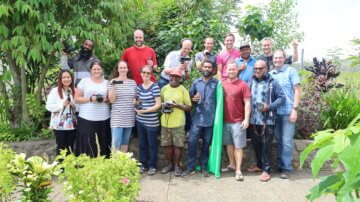
Informing, teaching, inspiring: PNG workshop teaches video storytelling for language communities
PNG workshop teaches video storytelling for language communities
Read more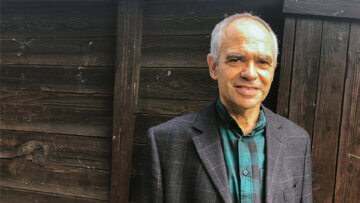
Looking ahead at 2024
As the year unfolds, we marvel at the work of God in our rapidly changing world. And, we look forward to a number of gatherings and conversations intended to draw us together.
Read more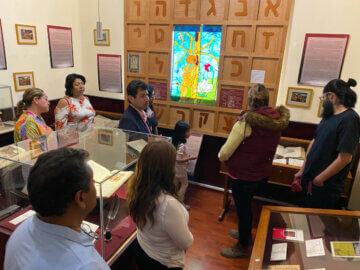
Telling the Bible's Story
It may come as a surprise that a museum is among the Wycliffe Global Alliance organisations.
Read more